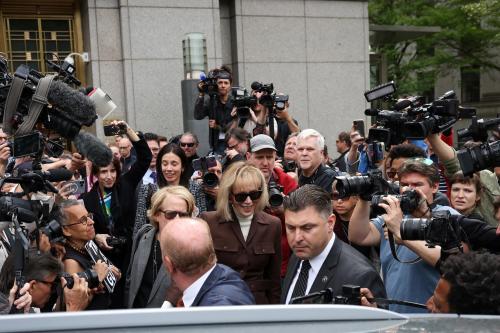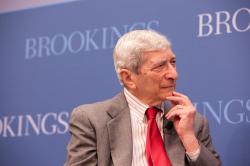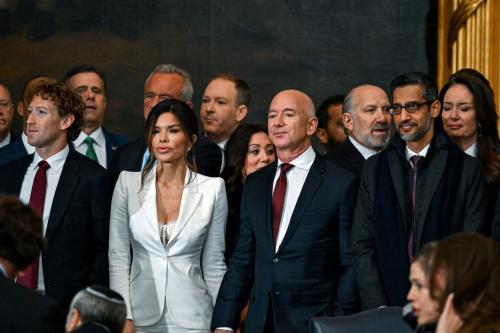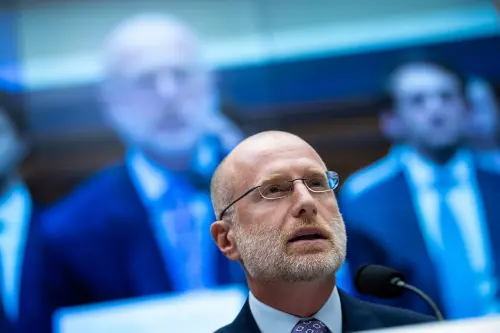It will take courage on the part of network executives, but a new approach to covering presidential candidates is needed as a result of Donald Trump’s campaigns. One has recently snapped into focus.
Number one: Don’t do live interviews. Because Trump, in particular, has proven himself to be an experienced TV performer, who has a history of false statements during live events, the live interview format makes it hard to correct falsehoods. For network executives, a live TV interview in the Trump era can be a trap. CNN’s Kaitlan Collins recently did a noble job of trying to catch up with his lies and misrepresentations, but she failed, as would, I suspect, most other TV news interviewers.
But there is an obvious way around the live TV interview. The pre-taped interview provides a network with two advantages: it can present the candidate’s views, in his or her own words, but it also provides built-in, pre-broadcast editing time for correcting the record.
An instructive historical example underscores the value of the pre-taped interview. In the early 1950’s, an anti-communist scourge called McCarthyism swept through the land, terrifying many people into silent acceptance of a senator’s assault on truth, threatening American democracy. McCarthyism was the ugly brainchild of Sen. Joseph McCarthy (R-WI). CBS’s legendary broadcaster, Edward R. Murrow considered McCarthy a clear challenge to American freedom and democracy. He broadcast a special report on McCarthy in March 1954, based not on a live interview, which McCarthy would likely have exploited, but on one spoken McCarthy quote after another, relying on the senator’s own words to explain his frightening policies. Murrow refused to do it live; he wanted — and needed — the time for editing. His brave broadcast is now part of American history.
Number two: Don’t allow Trump or any other candidate to determine the political coloration of the audience. Aside from avoiding live interviews, there is another way of providing responsible TV coverage of candidates like Trump. CNN claimed there were “no conditions” to Trump’s agreement to appear on CNN, a network he regularly disparaged as an “enemy of the people.” But the audience was seemingly loaded with pro-Trump GOPers, plus undecideds, but with no Democrats or critics. This audience provided Trump with a readymade cheering section that laughed at his humor and conveyed a misleading impression of national approval. Many women, I suspect, would be unlikely to giggle along with Trump’s repeated denigration of women.
Number three: Don’t become an arm of a presidential campaign. Unintentionally, CNN became just that. By inviting the GOP’s strongest candidate, CNN gave Trump, “his best campaign moment so far,” judged The Hill newspaper. He attracted more than 3 million viewers, temporarily boosting CNN’s sagging ratings. His TV appearance helped distract attention from “sexual abuse” charges leveled against him in a New York courtroom the day before. And it helped him “consolidate his lock” on the GOP nomination, according to Times columnist Bret Stephens. “The more attention we give him,” Stephens said, “the stronger he gets.”
CNN’s town hall served Trump in another way, too. It resembled a mini rally, which is Trump’s favored format. During the 2016 campaign, Trump attracted live coverage of his rallies, where he dominated the political scene with his uninhibited attacks on many of his favorite targets, including the “fake media” and the political opposition. The cable networks provided Trump with free, valuable airtime, more than they gave his Democratic opponent, hundreds of free hours of it, with no time for counterargument or correction. Trump “owned” the airways then, and now, post-CNN town hall, he may be on the edge of owning or controlling them again.
Number four: Don’t cover presidential candidates’ rallies in full. Against this embarrassing backdrop, cable networks must decide now that during the 2024 campaign there will be no live coverage of a Trump rally, or any other candidate’s either. However, if a network wishes to cover a rally for some political color or a newsworthy quote, that would be fine, but nothing more. And if Trump makes news with a startling accusation or comment on national or world affairs, the network can always break into its regularly scheduled news programs and report the news. That is, after all, the network’s primary responsibility — to report the news.
CNN justified its controversial Trump decision by stating the obvious — Trump is a declared candidate for re-election, he is, say the polls, the leading GOP candidate, and some polls show him beating President Joe Biden by 7 points, as of now.[1] All true, but Trump is a candidate like no other. He is under investigation for violating laws and regulations governing the control of presidential papers, for instigating the January 6 insurrection and for blatant interference in Georgia’s election laws, and he is accused of having sexually abused any number of women.
Republicans may one day decide they’ve had enough of Trumpian drama, though evidence to that effect is still wanting. Up to this time, though, Trump remains the GOP’s top candidate, a proven master of TV self-promotion and fundraising, and Houdini-like (until very recently) in his continuing ability to avoid sanction in a number of major cases. Trump knows he’s news, and he seems to feel entitled to live coverage.
But the fact is network executives make the big decisions on who gets live coverage, when they get it and who or what composes the audience. These are major decisions, and in a highly competitive TV environment, where every ratings point makes or loses millions, these are difficult decisions. But given the continuing central importance of television in political campaigns, network executives now find themselves carrying a very heavy responsibility.
[1] For a more detailed description of Trump’s support see: https://www.washingtonpost.com/politics/2023/05/12/trump-supporters-cnn-townhall/
The Brookings Institution is committed to quality, independence, and impact.
We are supported by a diverse array of funders. In line with our values and policies, each Brookings publication represents the sole views of its author(s).







Commentary
A roadmap for TV coverage of the 2024 presidential campaign
May 18, 2023